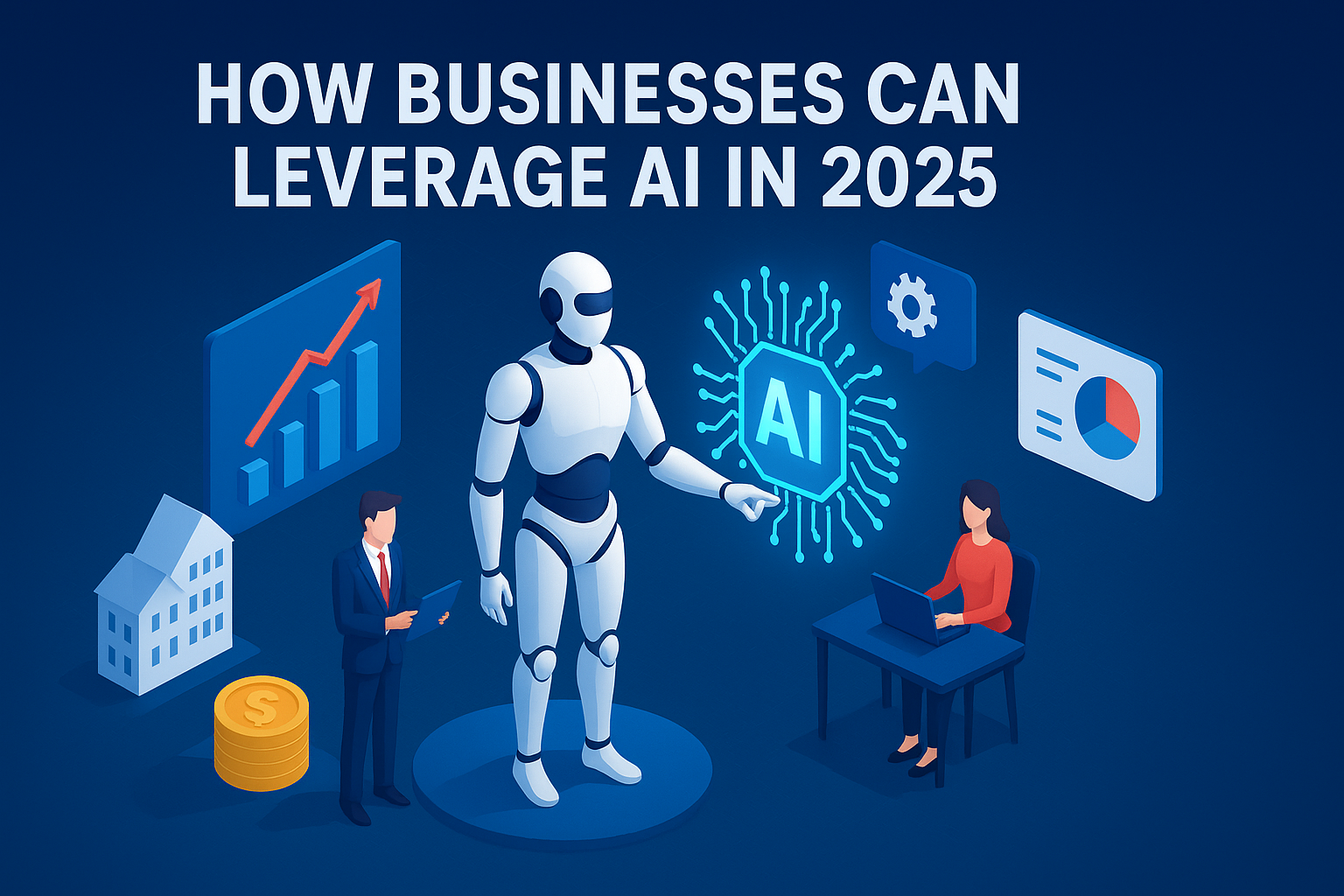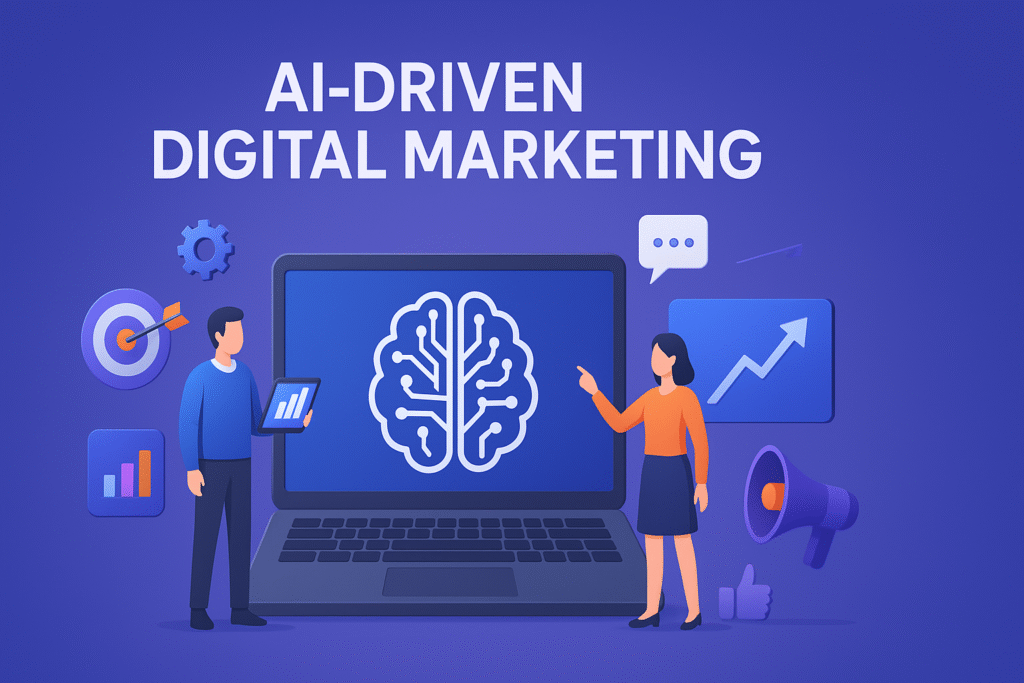The digital marketing world is evolving faster than ever, and in 2025, AI-driven digital marketing is no longer just a buzzword—it’s a necessity. Businesses across industries are realizing that traditional strategies aren’t enough to compete in an era where consumer expectations, search engine algorithms, and digital platforms are heavily influenced by artificial intelligence.
If you’ve been wondering why AI is becoming the backbone of modern marketing, the answer is simple: it allows brands to move smarter, faster, and more effectively. By leveraging data insights, predictive analytics, and intelligent automation, businesses can finally deliver the kind of personalized and relevant experiences customers demand.
In this blog, we’ll break down what AI-driven marketing really means, why it’s crucial in 2025, and how you can harness its power to stay ahead of your competition.
Table of Contents
What Is AI-Driven Digital Marketing?
At its core, AI-driven digital marketing refers to the use of artificial intelligence technologies—such as machine learning, natural language processing (NLP), and predictive analytics—to optimize marketing campaigns and customer interactions.
Unlike traditional marketing, which relies on manual research and generalized strategies, AI allows marketers to process huge amounts of data in seconds, uncover hidden patterns, and make smarter decisions.
Here’s a simple comparison:
| Traditional marketing | AI-driven marketing |
| Run campaigns based on assumptions and limited data. | Run campaigns based on real-time data, predictive models, and personalized targeting. |
That’s why AI is reshaping how brands approach SEO, content creation, advertising, social media, and customer engagement.
Why AI Is Crucial in 2025?
There are several reasons why AI has become a critical part of digital marketing strategies in 2025:
- Data Overload – Every second, billions of online interactions generate data. Without AI, businesses simply can’t make sense of this massive information stream.
- Google’s AI-First Updates – Search algorithms are now powered by AI (like Google’s RankBrain, BERT, and Gemini models). If your strategy doesn’t align with AI-driven SEO, ranking becomes nearly impossible.
- Consumer Expectations – Customers expect brands to understand their needs instantly. AI enables hyper-personalization, ensuring people see the right content, product, or ad at the right time.
- Competitive Advantage – Companies adopting AI early are gaining a major lead. Those ignoring it are already falling behind in traffic, conversions, and customer retention.
In short, AI is not just a trend; it’s the foundation of digital marketing in 2025.
Key Applications of AI in Digital Marketing
Let’s explore how AI is being used across different areas of digital marketing:
1. AI in SEO
- Smarter keyword research with intent analysis.
- AI SEO tools that predict which keywords are likely to perform.
- Content optimization based on semantic search.
2. AI in Content Marketing
- AI-powered tools that suggest blog topics and optimize readability.
- Predictive analytics to identify what type of content will engage audiences.
- Automated personalization (delivering different content for different users).
3. AI in Advertising & PPC
- Real-time bidding with AI ensures ad spend is optimized.
- Automated targeting and audience segmentation.
- Predictive analysis to forecast ROI on campaigns.
4. AI in Email Marketing
- Hyper-personalization at scale (tailored subject lines, product suggestions).
- Send-time optimization for higher open rates.
- Predictive lead scoring for better targeting.
5. AI in Social Media Marketing
- Trend prediction and automated social listening.
- AI-powered content recommendations.
- Chatbots for instant engagement.
6. AI in Customer Experience (CX)
- Virtual assistants and chatbots for 24/7 support.
- Voice search optimization.
- Personalized recommendations based on browsing behavior.
Benefits of AI-Driven Digital Marketing
So, why should you embrace AI in your digital strategy?
- Personalization at Scale – Every customer can receive a unique experience.
- Higher ROI – AI reduces wasted ad spend by focusing on high-intent audiences.
- Smarter Decisions – Data-backed strategies outperform guesswork.
- Enhanced Engagement – AI ensures you’re meeting customers at the right time with the right message.
- Future-Proof Strategy – As more platforms adopt AI, staying ahead is easier if you’re already aligned.
Challenges of AI Adoption in Marketing
Of course, adopting AI comes with challenges:
- Data Privacy – AI relies on customer data, making compliance with privacy laws crucial.
- Initial Investment – AI tools and skilled teams can be costly.
- Balancing Automation & Creativity – Over-reliance on automation can make campaigns feel impersonal if not monitored properly.
Future Trends of AI in Digital Marketing (2025 & Beyond)
Looking ahead, here are some AI marketing trends to watch:
- Voice & Visual Search Domination – Consumers are using images and voice commands to search, and AI is powering these experiences.
- Generative AI for Marketing Assets – From ad copy to video creation, AI is helping brands produce high-quality content at scale.
- Predictive Consumer Behavior – AI will predict what customers want before they even search for it.
- Integration with AR/VR – AI-driven immersive marketing will play a huge role in shopping and brand experiences.
How Businesses Can Leverage AI in 2025?

You don’t have to overhaul your entire marketing strategy overnight. Here’s how you can start leveraging AI today:
- Adopt AI Tools Gradually – Start with AI chatbots or personalization engines.
- Focus on Data Quality – AI is only as good as the data you feed it.
- Invest in Training – Upskill your marketing team on AI-driven tools.
- Combine Human Creativity with AI Efficiency – Use AI to analyze and automate, but let human creativity drive storytelling.
Conclusion
AI-driven digital marketing is no longer optional—it’s the backbone of successful campaigns in 2025. From SEO and content creation to customer engagement and predictive analytics, AI is redefining how businesses connect with audiences.
If you want to remain competitive, now is the time to integrate AI into your marketing strategy. The brands that embrace this change will thrive, while those that hesitate risk being left behind.
FAQs
1. What is AI-driven digital marketing in simple terms?
It’s the use of artificial intelligence tools and technologies to make marketing more efficient, data-driven, and personalized.
2. How is AI changing SEO in 2025?
AI is powering search intent analysis, smarter keyword targeting, and content optimization aligned with Google’s AI-first algorithms.
3. What tools are best for AI in digital marketing?
Popular tools include AI SEO tools, AI chatbots, content optimization platforms, and predictive analytics software.
4. Can small businesses use AI for marketing?
Yes. Many affordable AI tools make it easy for small businesses to adopt personalization, chatbots, and automated campaigns.
5. What are the risks of AI in marketing?
The main risks are over-reliance on automation, data privacy concerns, and the need for skilled implementation.



